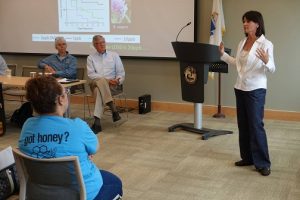
Westborough – Honey bees, wild bees, butterflies, beetles and other pollinators, as well as species that depend on them, are under extreme environmental stress, which will only get worse unless humans act soon to remedy the challenges facing these species responsible for one third of the food we eat.
That from a panel of experts from various disciplines who attended a seminar entitled, “Pollinators in Decline: Steps to Protect Them in Massachusetts,” at MassWildife headquarters in Westborough Sept. 16. About 75 people from as far away as Williamstown, Mass. attended the seminar to hear about solutions to this growing problem.
Beekeepers, biologists, zoologists, botanists and others concerned with the declining health of pollinators mapped out a multi-pronged solution that includes reducing the use of harmful pesticides, cultivating pollinator friendly plants, and continuing with peer reviewed scientific research showing the causes of decline.
State Rep. Carolyn Dykema (D-Holliston) has filed a bill called the Massachusetts Pollinator Protection Act (H-2113), which would restrict, but not ban, a class of pesticides called neonicotinoids (neonics), shown in many studies to have negative impacts on honey bees, wild bees, butterflies and other pollinators, as well as some bird species. The bill would primarily restrict use of neonics to trained licensed applicators and mandate plants treated with neonics be labeled so consumers could make informed choices.
The bill has been cosponsored by 135 Democratic and Republican legislators in the state House of Representatives and Senate, and will be the subject of a public hearing next month before the Joint Committee on Environment, Natural Resources and Agriculture. State Sen. Jamie Eldridge (D-Acton) has introduced the bill in the Senate.

















